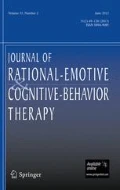Abstract
The Angry Cognitions Scale (ACS; Martin and Dahlen in J Ration Emot Cogn Behav Therapy 25:155–173, 2007) was designed to measure six cognitive processes related to anger: misattributing causation, overgeneralizing, catastrophizing, demandingness, inflammatory labeling, and adaptive processes. Preliminary evidence on the reliability of the ACS has been positive, demonstrating that the ACS is correlated with the experience and expression of anger, anger consequences, hostile thoughts, and responses to provocation (Martin and Dahlen in J Ration Emot Cogn Behav Therapy 25:155–173, 2007; J Ration Emot Cogn Behav Therapy, 29:65–76, 2011). This previous research, however, has suffered from limitations associated with demand characteristics and the reliance on retrospective data. The current study sought to address these limitations by using daily emotion logs. Results showed that the ACS predicted the daily experience of anger and anger related consequences, contributing to the literature on the ACS as a valuable measure of anger-related cognitions.
Similar content being viewed by others
References
Beck, A. T. (1999). Prisoners of hate: The cognitive basis of anger, hostility, and violence. New York, NY: Harper Collins Publishers.
Bruehl, S., Liu, X., Burns, J. W., Chont, M., & Jamison, R. N. (2012). Associations between daily chronic pain intensity, daily anger expression, and trait anger expressiveness: An ecological momentary assessment study. Pain, 153, 2352–2358.
Dahlen, E. R., & Martin, R. C. (2005). The experience, expression, and control of anger in perceived social support. Personality and Individual Differences, 39, 391–401.
Dahlen, E. R., & Martin, R. C. (2006). Refining the anger consequences questionnaire. Personality and Individual Differences, 41, 1021–1031.
Deffenbacher, J. L. (1992). Trait anger: Theory, findings, and implications. In C. D. Spielberger & J. N. Butcher (Eds.), Advances in personality assessment (Vol. 9, pp. 177–201). Hillsdale, NJ: Lawrence Erlbaum Associates.
Deffenbacher, J. L. (1996). Cognitive-behavioral approaches to anger reduction. In K. S. Dobson & K. D. Craig (Eds.), Advances in cognitive-behavioral therapy (pp. 31–62). Thousand Oaks, CA: Sage.
Deffenbacher, J. L. (2006). Evidence for effective treatment of anger-related disorders. In E. L. Feindler (Ed.), Anger related disorders: A practitioner’s guide to comparative treatments (pp. 43–69). New York: Springer.
Deffenbacher, J. L., Oetting, E. R., Lynch, R. S., & Morris, C. D. (1996). The expression of anger and its consequences. Behaviour Research and Therapy, 34, 575–590.
DiGiuseppe, R., & Tafrate, R. C. (2007). Understanding anger disorders. New York, NY: Oxford.
DiGiuseppe, R., & Tafrate, R. C. (2011). Anger regulation and expression scale. North Tonawanda, NY: Multi-Health Systems.
Dryden, W. (1990). Dealing with anger problems: Rational-emotive therapeutic interventions. Sarasota, FL: Practitioner’s Resource Exchange, Inc.
Eckhardt, C., & Jamison, T. R. (2002). Articulated thoughts of male dating violence perpetrators during anger arousal. Cognitive Therapy and Research, 26, 289–308.
Eckhardt, C., & Kassivove, H. (1998). Articulated cognitive distortions and cognitive deficiencies in maritally violent men. Journal of Cognitive Psychotherapy, 12, 231–248.
Eiden, R. D., Leonard, K. E., Colder, C. R., Homish, G. G., Schuetze, P., Gray, T. R., et al. (2012). Anger, hostility, and aggression as predictors of persistent smoking during pregnancy. Journal of Studies on Alcohol and Drugs, 73, 926–932.
Ellis, A. (1977). How to live with- and without-anger. New York, NY: Reader’s Digest Press.
Helmers, K. F., Posluszny, D. M., & Krantz, D. S. (1994). Associations of hostility and coronary artery disease: A review of studies. In A. W. Siegman & T. W. Smith (Eds.), Anger, hostility, and the heart (pp. 67–96). Hinsdale, NJ: Lawrence, Erlbaum.
Izard, C. E. (1972). Patterns of emotions: A new analysis of anxiety and depression. New York: Academic Press.
Loehman, J. E., Boxmeyer, C. L., & Powell, N. P. (2012). Cognitive-behavioral intervention for anger and aggression: The Coping Power Program. In S. R. Jimerson, A. B. Nickerson, M. J. Mayer, & M. J. Furlong (Eds.), Handbook of school violence and school safety: International research and practice (2nd ed., pp. 579–591). New York, NY: Taylor & Francis Group.
Martin, R. C., & Dahlen, E. R. (2004). Irrational beliefs and the experience and expression of anger. Journal of Rational Emotive and Cognitive-Behavior Therapy, 22, 3–20.
Martin, R. C., & Dahlen, E. R. (2007). The Angry Cognitions Scale: A new inventory for assessing cognitions in anger. Journal of Rational-Emotive & Cognitive-Behavior Therapy, 25, 155–173.
Martin, R. C., & Dahlen, E. R. (2011). Angry thoughts and response to provocation: Validity of the Angry Cognitions Scale. Journal of Rational-Emotive & Cognitive-Behavior Therapy, 29, 65–76.
Mizes, J. S., Morgan, G. D., & Buder, J. (1990). The relationship of cognitions, assertion, and anger arousal. Journal of Cognitive Psychotherapy: An International Quarterly, 4, 369–376.
Nichols, A., & Maner, J. K. (2008). The good-subject effect: Investigating participant demand characteristics. Journal of General Psychology, 135, 151–165.
Sirois, B. C., & Burg, M. M. (2003). Negative emotion and coronary heart disease: A review. Behavior Modification, 27, 83–102.
Snyder, C. R., Crowson, J. R., Houston, B., Kurylo, M., & Poirier, J. (1997). Assessing hostile automatic thoughts: Development and validation of the HAT Scale. Cognitive Therapy and Research, 21, 477–492.
Spielberger, C. D. (1999). State-trait anger expression inventory-revised. Odessa, FL: Psychological Assessment Resources, Inc.
Sukhodolsky, D. G., Golub, A., & Cromwell, E. N. (2001). Development and validation of the Anger Rumination Scale. Personality and Individual Differences, 31, 689–700.
Sukhodolsky, D. G., & Scahill, L. (2012). Cognitive-behavioral therapy for anger and aggression in children. New York: Guilford Press.
Tafrate, R. C., Kassinove, H., & Dundin, L. (2002). Anger episodes in high and low trait anger community adults. Journal of Clinical Psychology, 58, 1573–1590.
Author information
Authors and Affiliations
Corresponding author
Rights and permissions
About this article
Cite this article
Martin, R.C., Vieaux, L.E. Angry Thoughts and Daily Emotion Logs: Validity of the Angry Cognitions Scale. J Rat-Emo Cognitive-Behav Ther 31, 219–230 (2013). https://doi.org/10.1007/s10942-013-0171-2
Published:
Issue Date:
DOI: https://doi.org/10.1007/s10942-013-0171-2



